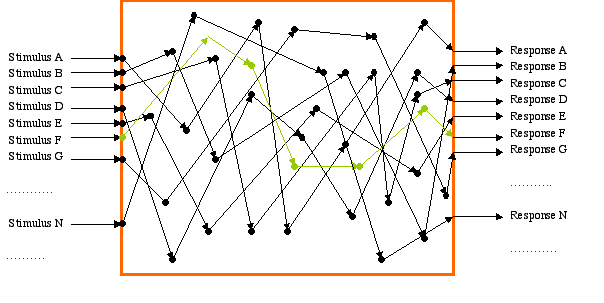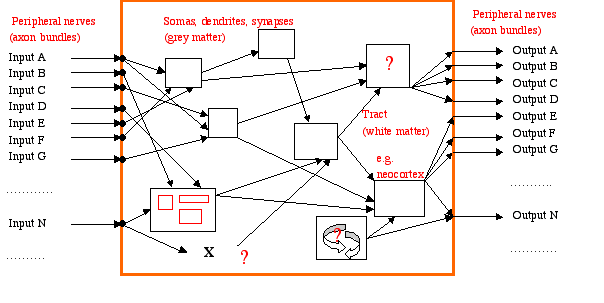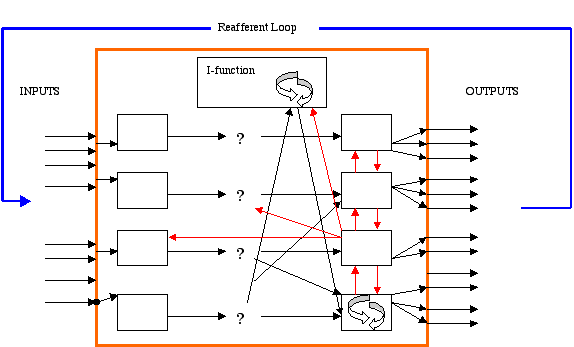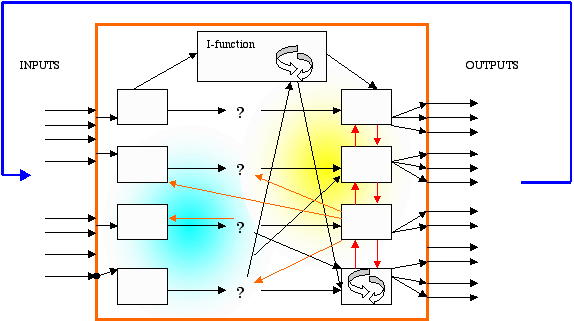Remote Ready Biology Learning Activities has 50 remote-ready activities, which work for either your classroom or remote teaching.
Serendip is an independent site partnering with faculty at multiple colleges and universities around the world. Happy exploring!

| BRAIN AND BEHAVIOR INSTITUTE 2001 | 
|

| |
 |  |
 | |
| Brain=Behavior? | What newly understood? | What remaining/new question? | |
|---|---|---|---|
| Gladys M. Baskerville | comfortable with; thankful that have interacting systems, since system complex, never to be fully understood | boxes inside boxes inside boxes; input starting in middle, output affects input; neuropharmacology, that dopamine affects so many things; will be more aware of medications; just don't know what things doing to your body | where is reasoning coming from, things so black and white as teacher but students just don't get it; storage of information in brain? how utilize in instruction? interested in formation and early years, fullest potential |
| Patrice J. Braxton | one third yes; is part of team | antiquated ways of thinking about science and about nervous system | open up world of science: how do we measure peak of performance? what same/different in babies/students/adults? Is there a peak or does one always learn? |
| Karen Cohen | |||
| Robert A. Cole | don't believe its "who you are"; that is the I-function? is that the spirit? | interested in how much of behavior one doesn't "think about" | needs to know more about I-function, how much does it affect behavior? do you want to have more control? does age affect that? how much I-function in baby? teenagers just want dopamine satisfied? have less trust in psychiatrists/psychologists prescribing medications ... less wrong makes one worry about taking medicine |
| Sylvia Cooper | works for me | understanding brain and rest of nervous system as total package, including neurons; brain and drug addiction; effects of things one eats | conflict resolution, avoiding violence, is environment? how use to better understand students? |
| Christeena Mathews | is too simple to say it like that | greater appreciation of brain as more than an organ, has a lot to do with who we are | how does soul, feelings, emotion fit into this? how bring into classroom |
| John Dalton | expanded notion of "brain" works; is not only what is above neck; don't like "glib" phrase; is problematic | has greater understanding of behavior not determined by I-function, very valuable | still lots of question about I-function, relation to consciousness/unconsciousness; interested in pharmacology, genetic influences |
| Pamela T. Harris | I too now believe are the same | brain and neurotransmitters, how connectedness of neurons produce a total person | how does b/b go with spirit, how does bb/spirit/environment go together, how use this information to help students, particularly those with, perhaps, "unhealthy connections"? |
| Bertha May Henson | yes, do now believe brain=behavior | every time input changes, whole situation changes | appetite whetted for more information, would like ongoing institute |
| Randal Holly | somewhat comfortable that is so | accomplishments of neuropharmacology, drugs that can both inhibit and facilitate behaviors | are synaptic connections continually reforming, or is it a static system reached at some point and not subsequently altered? can drugs repair synaptic connections |
| Sharon P. Lee | are the same thing | boxes within boxes within; outputs affecting inputs; drugs and inhibitors (would like more) | what are long term effects of drugs? how does rehabilitation work? how identify/deal with chemical imbalances |
| Janet P. Middleton | yes; are constantly thinking therefore processing | fascinated by how things start and stop in middle; understood before there was something there but now can explain to a student in terms of neurons | how apply information to student learning? how maximize student potential? |
| Susannah Starkweather | yes | mechanics of how neurons work, potentials; overwhelmed with complexity | where is research going? what are practical uses? |
| Regina Toscani | yes, but qualify with possibility that some inputs are "spiritual" | now understand why Christopher can move leg; I-function a small part of brain/nervous system | old: how much control does I-function have; are there ways to increase its control? |
| Nayjuana Woodberry |
| Extrasensory perception: One can learn/know without experiencing: proprioception/pheromones, as well as "five sense" info that by passes I-function |
Still more brain as painting - color - "if the tree falls in the forest ...?"
| Conflict and conflict resolution: learning from the brain
judge less; appreciate more, what others' stories can do for each other, for oneself elements of rationality, creativity, self without I-function - where/what is "reason"? |
Visual pathways and Blind sight
Between input and output: self and "intrinsic variability" in the frog
One more step on the way to the I-function
